

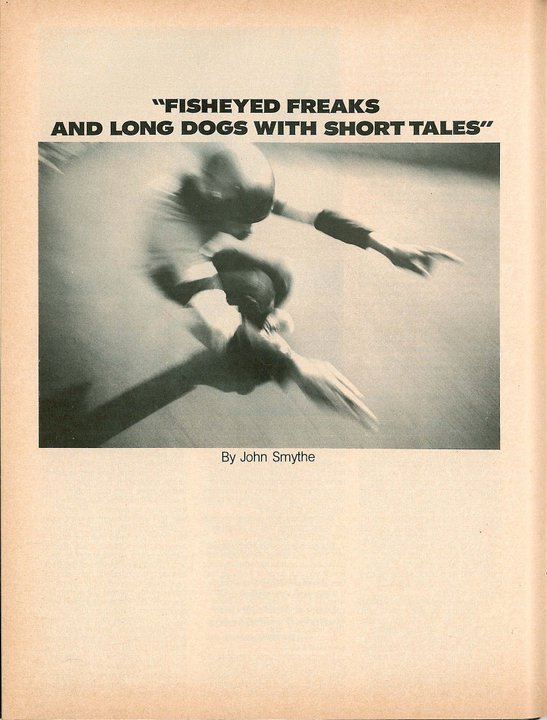
CLICK ANY IMAGE TO ENLARGE
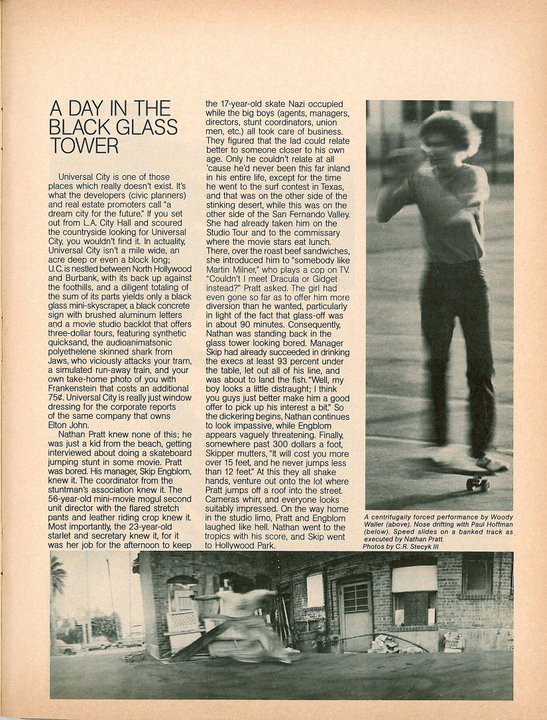
| 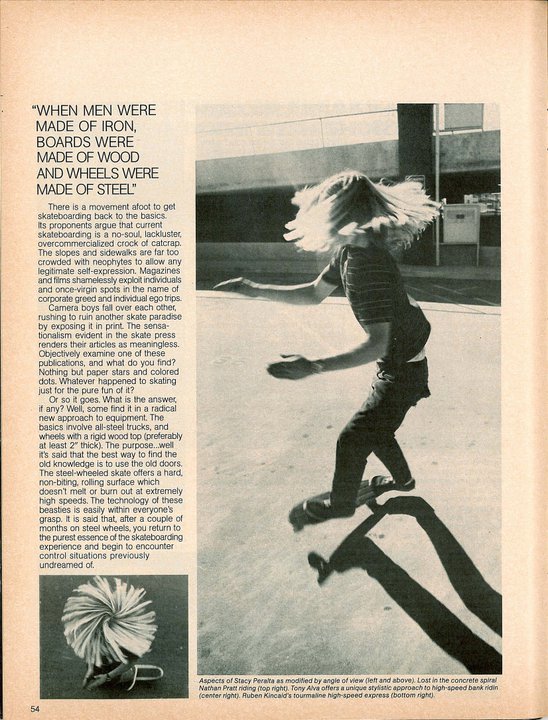
|
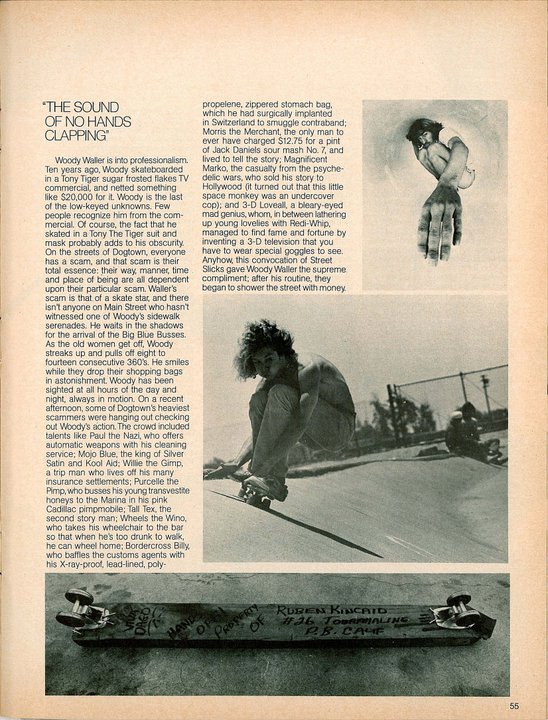
| 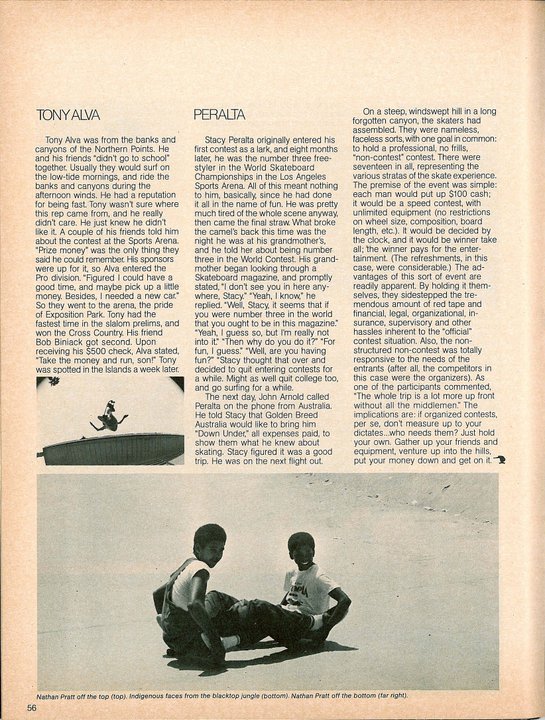
| 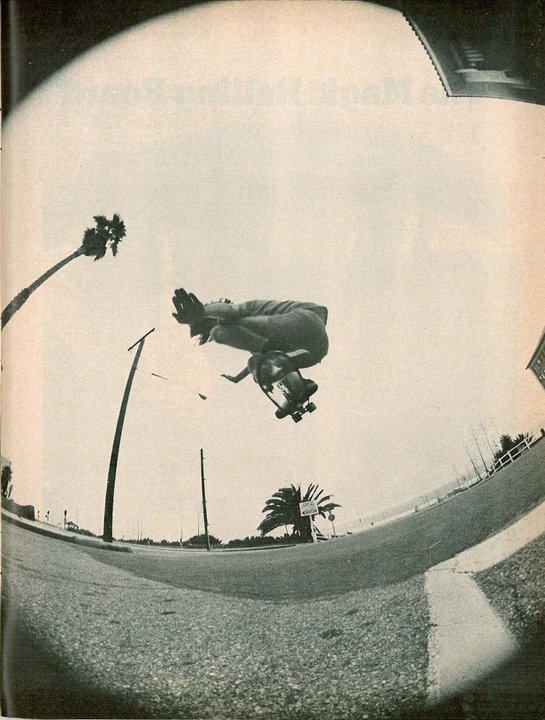
|
A day in the black Glass tower
Nathan Pratt knew none of this; he
was just a kid from the beach, getting
interviewed about doing a skateboard
jumping stunt in some movie. Pratt
was bored. His manager, Skip Engblom.
knew it. The coordinator from the
stuntman's association knew it. The
56-year-old mini-movie mogul second
unit director with the flared stretch
pants and leather riding crop knew it.
Most importantly the 23-year-old
starlet and secretary knew it, for it
was her job for the afternoon to keep
the 17-year old skate Nazi occupied
while the big boys (agents, managers,
directors, stunt coordinators, union
men, etc.) all took care of business.
They figured that the lad could relate
better to someone closer to his own
age. Only he couldn't relate at all
'cause he'd never been this far inland
in his entire life, except for the time
he went to the surf contest in Texas,
and that was on the other side of the
stinking desert, while this was on the
other side of the San Fernando Valley
She had already taken him on the
Studio Tour and to the commissary
where the movie stars eat lunch.
There, over the roast beef sandwiches,
she introduced him to "somebody like
Martin Milner, who plays a cop on TV.
Couldn't I meet Dracula or Gidget
instead? Pratt asked. The girl had
even gone so far as to offer him more
diversion than he wanted, particularly
in light of the fact that glass-off was
in about 90 minutes. Consequently
Nathan was standing back in the
glass tower looking bored. Manager
Skip had already succeeded in drinking
the execs at least 93 percent under
the table, let out all of his line, and
was about to land the fish. "Well, my
boy looks a little distraught; I think
you guys just better make him a good
offer to pick up his interest a bit." So
the dickering begins, Nathan continues
to look impassive, while Engblom
appears vaguely threatening. Finally,
somewhere past 300 dollars a foot,
Skipper mutters, "It will cost you more
over 15 feet, and he never jumps less
than 12 feet." At this they all shake
hands, venture out onto the lot where
Pratt jumps off a roof into the street.
Cameras whirr, and everyone looks
suitably impressed. On the way home
in the studio limo, Pratt and Engblom
laughed like hell. Nathan went to the
tropics with his score, and Skip went
to Hollywood Park.
"WHEN MEN WERE
MADE OF IRON,
Camera boys fall over each other,
rushing to ruin another skate paradise
by exposing it in print. The sensationalism evident in the skate press
renders their articles as meaningless.
Objectively examine one of these
publications, and what do you find?
Nothing but paper stars and colored
dots. Whatever happened to skating
just for the pure fun of it?
Or so it goes. What is the answer,
if any? Well, some find it in a radical
new approach to equipment The
basics involve all-steel trucks, and
wheels with a rigid wood top (preferably
at least 2" thick). The purpose...well
it's said that the best way to find the
old knowledge is to use the old doors.
The steel-wheeled skate offers a hard,
non-biting, rolling surface which
doesn't melt or burn out at extremely
high speeds. The technology of these
beasties is easily within everyone's
grasp. It is said that. after a couple of
months on steel wheels, you return to
the purest essence of the skateboarding
experience and begin to encounter
control situations previously
undreamed of.
SkateBoarder Magazine
Vol. 2, No.5
June, 1976
By John Smythe
Universal City is one of those
places which really doesn't exist. It's
what the developers (civic planners)
and real estate promoters call "a
dream city for the future." If you set
out from L.A. City Hall and scoured
the countryside looking for Universal
City you wouldn't find it. In actuality
Universal City isn't a mile wide, an
acre deep or even a block long;
U.C. is nestled between North Hollywood
and Burbank, with its back up against
the foothills, and a diligent totaling of
the sum of its parts yields only a black
glass mini-skyscraper; a black concrete
sign with brushed aluminum letters
and a movie studio backlot that offers
three-dollar tours, featuring synthetic
quicksand, the audioanimatsonic
polyethylene skinned shark from
Jaws, who viciously attacks your tram,
a simulated run-away train, and your
own take-home photo of you with
Frankenstein that costs an additional
75 cents. Universal City is really just window
dressing for the corporate reports
of the same company that owns
Elton John.
BOARDS WERE
MADE OF WOOD
AND WHEELS WERE
MADE OF STEEL"
There is a movement afoot to get
skateboarding back to the basics
Its proponents argue that current
skateboarding is a no-soul, lackluster,
overcommercialized crock of catcrap.
The slopes and sidewalks are far too
crowded with neophytes to allow any
legitimate self-expression. Magazines
and films shamelessly exploit individuals
and once-virgin spots in the name of
corporate greed and individual ego-trips.
NO HANDS
CLAPPING"
Woody Waller is into professionalism.
Ten years ago, Woody skateboarded
in a Tony Tiger sugar frosted flakes TV
commercial, and netted something
like $20,000 for it. Woody is the last
of the low-keyed unknowns. Few
people recognize him from the commercial. Of course, the fact that he
skated in a Tony The Tiger suit and
mask probably adds to his obscurity
On the streets of Dogtown, everyone
has a scam, and that scam is their
total essence: their way, manner, time
and place of being are all dependent
upon their particular scam. Waller's
scam is that of a skate star, and there
isn't anyone on Main Street who hasn't
witnessed one of Woody's sidewalk
serenades. He waits in the shadows
for the arrival of the Big Blue Buses.
As the old women get off, Woody
streaks up and pulls off eight to
fourteen consecutive 360's. He smiles
while they drop their shopping bags
in astonishment. Woody has been
sighted at all hours of the day and
night, always in motion. On a recent
afternoon, some of Dogtown's heaviest
scammers were hanging out checking
out Woody's action. The crowd included
talents like Paul the Nazi, who offers
automatic weapons with his cleaning
service; Mojo Blue, the king of Silver
Satin and Kool Aid: Willie the Gimp,
a trip man who lives off his many
insurance settlements; Purcelle the
Pimp, who busses his young transvestite
Honeys to the Marina in his pink
Cadillac pimpmobile: Tall Tex, the
second story man: Wheels the Wino,
who takes his wheelchair to the bar
so that when he's too drunk to walk,
he can wheel home; Bordercross Billy,
who baffles the customs agents with
his X-ray-proof, lead-lined, poly-propelene, zippered stomach bag,
which he had surgically implanted
in Switzerland to smuggle contraband;
Morris the Merchant, the only man to
ever have charged $12.75 for a pint
of Jack Daniels sour mash No. 7, and
lived to tell the story; Magnificent
Marko, the casualty from the psychedelic wars, who sold his story to
Hollywood (it turned out that this little
space monkey was an undercover
cop); and 3-D Loveall, a bleary-eyed
mad genius, whom, in between lathering
up young lovelies with Redi-Whip,
managed to find fame and fortune by
inventing a 3-D television that you
have to wear special goggles to see.
Anyhow this convocation of Street
Slicks gave Woody Waller the supreme
compliment; after his routine, they
began to shower the street with money.
TONY ALVA
Tony Alva was from the banks and
canyons of the Northern Points. He
and his friends "didn't go to school"
together. Usually they would surf on
the low-tide mornings, and ride the
banks and canyons during the
afternoon winds. He had a reputation
for being fast. Tony wasn't sure where
this rep came from, and he really
didn't care. He just knew he didn't
like it. A couple of his friends told him
about the contest at the Sports Arena.
"Prize money" was the only thing they
said he could remember. His sponsors
were up for it, so Alva entered the
Pro division. "Figured I could have a
good time, and maybe pick up a little
money Besides, I needed a new car."
So they went to the arena, the pride
of Exposition Park. Tony had the
fastest time in the slalom prelims, and
won the Cross Country His friend
Bob Biniak got second. Upon
receiving his $500 check, Alva stated,
"Take the money and run, son!" Tony
was spotted in the Islands a week later.
PERALTA
Stacy Peralta originally entered his first contest as a lark, and eight months
later, he was the number three freestyler in the World Skateboard
Championships in the Los Angeles
Sports Arena. All of this meant nothing
to him, basically, since he had done
it all in the name of fun. He was pretty
much tired of the whole scene anyway.
Then came the final straw. What broke
the camel's back this time was the
night he was at his grandmother's,
and he told her about being number
three in the World Contest. His grandmother began looking through a
Skateboard magazine, and promptly
stated, "I don't see you in here anywhere, Stacy" "Yeah, I know" he
replied. "Well, Stacy it seems that if
you were number three in the world
that you ought to be in this magazine"
"Yeah, I guess so, but I'm really not
into it" "Then why do you do it?" "For
fun, I guess" "Well, are you having
fun?" "Stacy thought that over and
decided to quit entering contests for
a while. Might as well quit college too,
and go surfing for a while.
The next day, John Arnold called Peralta on the phone from Australia. He told Stacy that Golden Breed Australia would like to bring him "Down Under" all expenses paid, to show them what he knew about skating. Stacy figured it was a good trip. He was on the next flight out.
On a steep, windswept hill in a long forgotten canyon, the skaters had assembled. They were nameless, faceless sorts, with one goal in common: to hold a professional, no frills, "non-contest" contest. There were seventeen in all, representing the various stratas of the skate experience The premise of the event was simple: each man would put up $100 cash: it would be a speed contest, with unlimited equipment (no restrictions on wheel size, composition, board length, etc.) It would be decided by the clock, and it would be winner take all; the winner pays for the entertainment. (The refreshments, in this case, were considerable.) The advantages of this sort of event are readily apparent. By holding it themselves. they sidestepped the tremendous amount of red tape and financial, legal, organizational, insurance, supervisory and other hassles inherent to the "official" contest situation. Also, the non- structured non-contest was totally responsive to the needs of the entrants (after all, the competitors in this case were the organizers). As one of the participants commented, "The whole trip is a lot more up front without all the middlemen" The implications are: if organized contests, per se, don't measure up to your dictates...who needs them? Just hold your own. Gather up your friends and equipment, venture up into the hills, put your money down and get on it.
